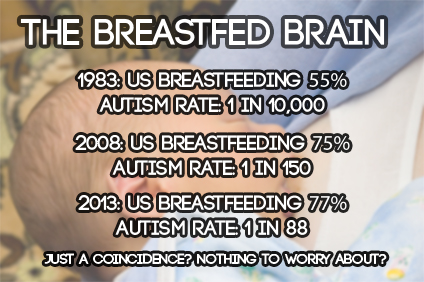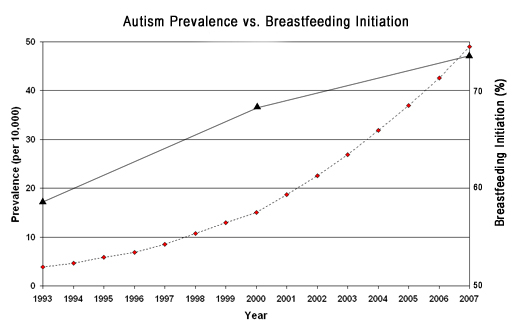Over the past 4 decades, there has been a shocking rise in the prevalence of autism. Antivax activists point out that there has been an dramatic increase in the number of vaccines that infants receive and conclude that vaccines cause autism. But here has also been a dramatic increases in breastfeeding rates. It is time for us to ask: Does breastfeeding cause autism?
The above image relates the statistics and the graph below illustrates the trend.
It’s pretty dramatic, isn’t it? So we should be rushing to investigate whether breastfeeding causes autism, right? We should direct our attention to the CDC recommendations designed to encourage breastfeeding and ask if the CDC is ignoring the harmful effects of breastfeeding, right? We should view lactation consultants with suspicion and we should demand that they inform new mothers of the very clear association between breastfeeding and autism, right?
Wrong!
Why not? Because correlation is not causation. Just because two phenomena rise is parallel does NOT mean that one caused the other.
If correlation is not causation, what is?
To determine if Event A caused Disease B, we need to investigate whether it satisfies Hill’s Criteria. These are 9 criteria, most of which much be satisfied before we can conclude that Event A is not merely correlated with Disease B, but Event A actually causes Disease B.
Who was Hill and why should we care about his criteria?
…These criteria were originally presented by Austin Bradford Hill (1897-1991), a British medical statistician as a way of determining the causal link between a specific factor (e.g., cigarette smoking) and a disease (such as emphysema or lung cancer)… [T]he principles set forth by Hill form the basis of evaluation used in all modern scientific research… Hill’s Criteria simply provides an additional valuable measure by which to evaluate the many theories and explanations proposed within the social sciences.
What are the criteria?
1. Temporal relationship: It may sound obvious, but if Event A causes Disease B, Event A must occur before Disease B. The is the only absolutely essential criterion, but it is NOT sufficient. Lay people often erroneously assume that because it’s the only essential criterion, it is the only criterion that counts. For example, vaccine rejectionists often point to the fact that childhood vaccinations usually occur before the onset of autism, but that does not mean that vaccination causes autism. Similarly, breastfeeding occurs before the onset of autism. Consider that learning to walk usually precedes autism, but obviously learning to walk does not cause autism.
2. Strength: This is measured by statistical tests, but can be thought of as similar to the closeness of the relationship. Is Disease B always preceded by Event A? Sometimes? Only rarely? Does Event A always cause Disease B? Sometimes? Only rarely? Lung cancer is not always preceded by cigarette smoking, but it usually is. Cigarette smoking does not always lead to lung cancer, but it does often lead to lung cancer. In other words, the relationship is fairly strong.
In the case of breastfeeding (or vaccines) and autism, breastfeeding (or vaccines) usually precede the diagnosis. However, most children who receive vaccines don’t develop autism. Thus the relationship is weaker.
3. Dose-response relationship: If cigarette smoking causes lung cancer, we would expect that smoking more cigarettes would increase the risk of lung cancer, which it does. In contrast, there appears to be no dose-response relationship between the length of breastfeeding (or the number of vaccinations) and the risk of developing autism.
4. Consistency: Have the findings that purported to show a relationship been replicated by other scientists, in other populations and at other times? If studies fail to consistently show the relationship, causation is very unlikely.
This is a critical point. One experiment or even a few experiments is NOT enough to determine causation. A large number of experiments that consistently show the same result is required. This is particularly important for vaccine rejectionists to note. The fact that a few studies claim to have shown that vaccination causes autism is meaningless when a very high proportion of studies show that there is not even a correlation between vaccination and autism.
5. Plausibility: In order to claim causation, you MUST offer a plausible mechanism. In the case of cigarette smoking, certain components of the smoke are known to cause damage to the cells inside the lungs, and cellular damage has been shown to lead to cancer. In contrast, no one has yet offered a plausible explanation for how breastfeeding (or vaccines) “cause” autism. In fact, no one can even agree on the specific component that is supposedly responsible.
6. Consideration of alternative explanations: This is self explanatory. In the case of breastfeeding (or vaccines) and autism, there is a very simple alternative explanation. Autism cannot be diagnosed before the age of 2 and breastfeeding (and most vaccines) are given before the age of 2.
7. Experiment: If you alter Event A do you still get Disease B. In the case of smoking, if you quite smoking, the risk of lung cancer goes down. In the case of breastfeeding (or vaccines) and autism, if you forgo vaccination, the risk of autism remains unchanged.
8. Specificity: Is Event A the only thing that leads to Disease B? This is the least important of the criteria. If it is present, it is a very powerful indicator of causation. For example, among young women who developed a rare form of vaginal cancer, all of them were found to have been exposed to DES (diethylstilbestrol) while in utero. That is a highly specific effect.
However, even if the relationship is not highly specific, that does not preclude causation. Though there are non-smokers who get lung cancer, it does not change the fact that the other criteria show that smoking causes lung cancer.
9. Coherence: The explanation of action must comport with the known laws of science. If the purported mechanism of causation violates the law of gravity, for example, then it isn’t acceptable. That’s why religious arguments against evolution are wrong. They are “incoherent” since they invoke forces outside science.
What do Hill’s criteria look like in action?
In the case of cigarette smoking and lung cancer, 8 out of 9 Hill’s Criteria are satisfied. In contrast, in the case of breastfeeding (or vaccines) and autism, only 3, possibly 4 criteria are satisfied. This is why we can say that the scientific evidence shows that breastfeeding (or vaccines) do not cause autism.
While it is true that breastfeeding (or vaccines) usually precede the diagnosis of autism, that is an essential criterion, but not enough. The fact that is there is no dose-response relationship, that the few studies that showed a purported relationship cannot be replicated and that there are no studies in which people who were not breastfed had a lower incidence of autism.
That’s how we know that breastfeeding does not cause autism.
That’s also how we know that vaccines don’t cause autism, either!
Adapted from a piece that first appeared in February 2011.



